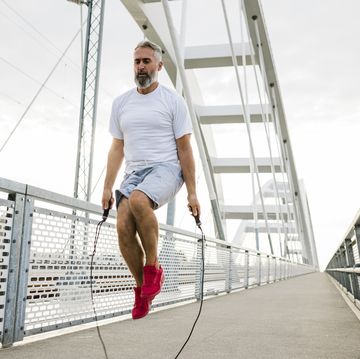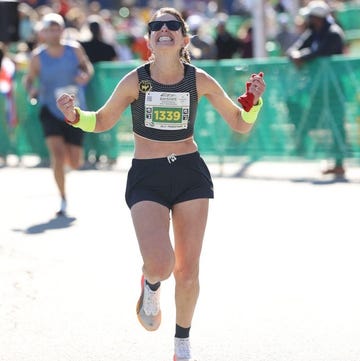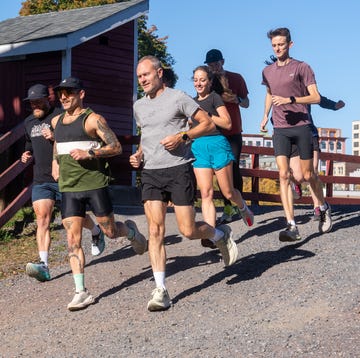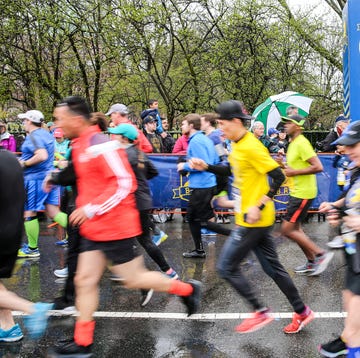Kristen Fryburg-Zaitz put in all the hard work expected of an elite distance runner. In preparation for the 2009 Chicago Marathon, she ran weekly long runs, tempo runs, and intervals, all at altitude in Boulder, Colorado. But despite arriving at the starting line in peak form, "I just didn't believe in myself," she says. Fryburg-Zaitz placed a disappointing 17th in 2:48:40, a full 11 minutes slower than she'd hoped. "I had so much doubt going into the race," she says. "I realized that I'd defeated myself mentally before I'd even started." So in April 2010, she sought the help of Stephen Walker, Ph.D., a sports psychologist in Boulder who taught her how to buoy her confidence. Walker's secret weapon? Mantras.
To achieve your running goals, powerful legs and big lungs aren't enough—you also need a strong head. Doubts and distractions can derail your attempts, but a well-chosen mantra can keep you calm and on target. "Repeating choice words whenever you need to focus helps direct your mind away from negative thoughts and toward a positive experience," says Walker.
Indeed, the Sanskrit word "mantra" literally means "instrument for thinking." As such, these short words or phrases have long been used to focus the mind in meditation, says David K. Ambuel, Ph.D., professor of philosophy at the University of Mary Washington in Virginia.
Fryburg-Zaitz used a visual aid to remember her mantras. At the 2010 U.S. 20-K Championships, she lined up wearing a multicolored wristband. Yellow signaled control for the early miles. Red meant power, for the hills. Green represented compete, to focus on remaining with the group. Pink corresponded to run strong and blue was magnet—a cue to accelerate to the finish line. The colorcoding worked: Fryburg-Zaitz's top-10 finish earned her a spot on the 2010 U.S. World Half-Marathon Championships team.
With Walker's guidance, Fryburg-Zaitz chose wisely. An effective mantra addresses what you want to feel, not the adversity you're trying to overcome, says Robert J. Bell, Ph.D., a certified consultant of the Association for Applied Sport Psychology. In fact, when discomfort strikes, the worst thing you can do is embrace the pain, says Walker. "When you start thinking, Oh, this hurts, Oh, I have a side stitch, Oh, my legs are tired—those negative thoughts pile on," he says. A good mantra diverts your mind from thoughts that reinforce the pain to thoughts that help you transcend it.
So what makes a good mantra? One that's short, positive, instructive, and full of action words. Walker suggests preparing multiple mantras before a race tailored to various challenges. And don't limit yourself to "real" words. A made-up word works for Tara Anderson, a 34-year-old runner in Boulder who recites, Lighter, softer, faster, relaxer. "I repeat it with each footstrike, and if I'm having a problem, I'll repeat the relevant part until I'm in the flow," she says. Her phrase helped her set a three-minute PR in a 10-K in 2009. Here's how you, too, can wring some running magic out of a few well-chosen words.
Do As We Say
Starting out easy
Shoes & Gear?
"Turn and burn."
—quot;Run fast, go past."
"Don't listen. Don't look. Just run."
—CHRIS EVANS GARTLEY, Managing Editor
&SCOTT JUREK, running 165.7 miles en route to breaking the American 24-hour record in May 2010
—MARK REMY, Executive Editor (Online)
Overcoming inclines...
&How to Run More Consistently
—DAVID WILLEY, RW Editor-in-Chief
"Hills are my friend."
—DAVID WILLEY, RW Editor-in-Chief
"Just stay calm."
—Other Hearst Subscriptions
All About the Run/Walk Method?
&Summoning a kick
—Best Running Shoes 2025
&This Glute Workout Will Ignite Your Power
—The Magic of Mantras
"Youre tougher than the rest."
—CHRIS EVANS GARTLEY, Managing Editor
Conquering 26.2?
"One mile at a time."
—All About 75 Hard
&CA Notice at Collection
—quot;Dont listen. Dont look. Just run."
&Keep it short
—Shoes & Gear
Fast Talk
Mantras that help elites reach peak performance
"Pass no one."
—SCOTT JUREK, running 165.7 miles en route to breaking the American 24-hour record in May 2010
"Define yourself."
—DEENA KASTOR, while winning the Chicago Marathon in 2005 and becoming the first American to win a major marathon since 1994
"You're tougher than the rest."
—SARAH REINERTSEN, in a half-Ironman qualifier that would earn her a spot at the Ironman World Championship, where she became the first female leg amputee to finish the event
&Running in the Cold
—RENEE METIVIER BAILLIE, winning the 2010 USATF Indoor 3000 meters. She wrote the words on her hand.
"Claw the ground."
—NCAA steeplechase champion JORDAN DESILETS in 2004, while breaking the four-minute barrier in the mile during his last collegiate race at that distance
"Be water."
—The Bruce Lee mantra that Olympic middle-distance runner BOLOTA ASMEROM uses to feel smooth but full of force
Mantra Maker
How to put together your perfect phrase
Keep it short
Your mantra should be an affirmation, not a novel. "When you're tired, you don't want something elaborate," says Stephen Walker. "It's too hard to remember." Keep it to five seconds or less.
Stay positive
Think of the problem you're trying to counteract and turn it around. "If you're feeling weak, your mantra should be I am strong," says Walker.
quot;Run fast, go past."
Your mantra should center on action verbs or strong adjectives, not abstract phrases, says Robert J. Bell. Look for words that convey energy, like "fast," "strong," or "power."
Embed instructions
Use the mantra to remind yourself what you plan to do or how you want to feel as you're running, says Walker. Now is the time; go for it. Or, Run relaxed. Finish strong.
How to put together your perfect phrase
Starting out easy.
A
Run
Go
Stride
Sprint
Be
B
Strong
Fast
Quick
Light
Fierce
C
Think
Feel
Embrace
Be
Hold
D
Power
Speed
Brave
Bold
Courage













